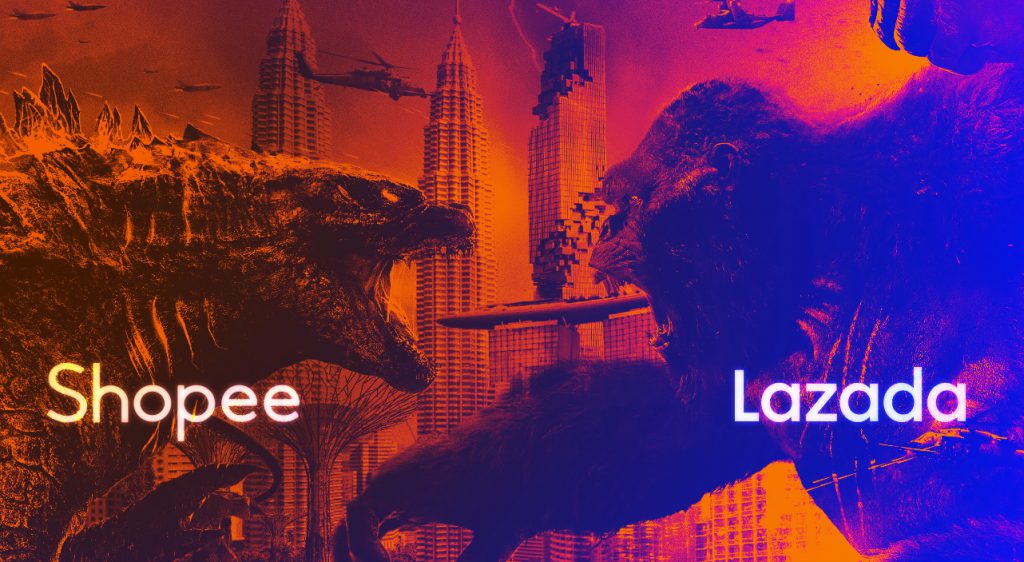Another Godzilla movie is about to launch later this month, but it looks like we’re witnessing a battle of quite real monsters in the e-commerce market in Southeast Asia today.
Shopee’s parent company, Sea Ltd., recently posted its financial results for 2020 and they make for an interesting reading.
Despite what you might otherwise have thought, with all the talk going on about how Covid-19 pandemic lifts digital businesses, the figures are not quite as clear-cut, at least by conventional standards.
While Sea has doubled its revenues, it has nearly doubled its costs as well and posted its biggest ever loss of US$1.6 billion (S$2.1 billion).
Yet, in this quite peculiar reality of the IT startup world, 2020 can be considered an exceptionally good year.
Sea Vs. Lazada
The company’s stock has continued to rally, bringing its market capitalisation close to US$120 billion right now (briefly exceeding US$140 billion in February) — up from around US$25 billion this time last year, and just US$5 billion in 2019.
In other words, $1,000 invested in Sea at the beginning of 2019 would now be worth close to $24,000 today — all of that while the company keeps bleeding money.

High valuation allowed it to raise more capital in the stock market, with a US$2.6 billion issuance in December, providing necessary funds to burn through in 2021 to reach the company’s stated target of further doubling its e-commerce revenues (as it has done in 2020).
This time, to about US$4.5 billion, or 112 per cent higher than last year, as it announced in its release.
It also seeks to use the funds to expand its offering of financial services, having secured a digital banking license in Singapore last year.
Shopee continues its stratospheric rise, within little over five years in business, leaving Alibaba-owned Lazada trailing behind. But it’s quite clear that while the Rocket Internet child may be down, it is not out yet.
With a new CEO appointed in 2020, and deep pockets that its Chinese parent offers, the war is likely to get more intense.
While Lazada doesn’t publish separate results since its acquisition in 2016, it’s quite certain that it too must be bleeding trying to keep up with its main rival.
In one corner of the ring we have the current market leader, able to raise significant funds thanks to its high market capitalisation.
On the other side, we have a challenger backed by a money-making Chinese behemoth, seeking to dominate its geographic backyard.
As a result, neither is currently at risk of losing steam.
Their battle is over long-term dominance across a growing market of 600+ million increasingly wealthier customers, so don’t expect any towels to be thrown in the near future.
Challenges That Shopee Needs To Overcome
In spite of its great results and clearly successful management, Sea Ltd. remains more exposed to external factors.
A stock market crash could limit its funding options (or make them relatively more expensive), and its current market capitalisation of US$120 to US$140 billion seems inflated in comparison to Alibaba’s US$635 billion or even Amazon’s US$1.5 trillion.
Sea is valued at eight to 10 per cent of Amazon’s market cap, while its revenue is mere one per cent, with almost half of it coming from its digital entertainment arm Garena.
Stock market situation remains difficult to predict as governments around the world try to support economies with both fiscal and monetary measures, which have contributed to stock price inflation.
Whether these rallies continue or face a painful correction remains to be seen and is anybody’s guess, since we’ve never been in a situation quite like this one.
Any volatility can hurt Sea more than Alibaba, and a significant economic crisis could end up giving the upper hand to Lazada.
It’s also uncertain whether the pace of e-commerce growth — fuelled by the pandemic in 2020 — is going to remain just as strong this year to allow Shopee to double its revenues again, as Sea Ltd. announced in its report.
Regardless of how these internal and external factors play out, it seems very unlikely that the stock is going to quintuple in value for the third year in a row.
Sea’s market capitalisation is more a vote of confidence of investors seeing its continued growth over competitors, rather than a reflection of current results.
What Does It Mean For Buyers And Sellers In SEA?
Expect even more aggressive advertising, discounts, offers, shipping options and low commissions for all merchants, as both giants continue to exchange blows in the years to come.
Sea has so far done very well in trying to establish itself as a homegrown, Southeast Asian brand, but for Alibaba, dominating the region is of strategic importance.
It’s only natural for the Chinese company to want to have its nearest vicinity under control. It also needs visible successes beyond national borders to prove to investors it can do well globally, not only in China (a curse plaguing many Chinese companies).
Covid-19 market rally has put Sea’s market capitalisation beyond any acquisition prospects and the company can get a stronger footing on its own.
In fact, it may use its capital to acquire smaller competitors and strengthen its e-commerce position more quickly that way.
But if an economic crisis strikes, pushing stock prices down, the tables may turn again and it may enter the radar of wealthier companies, much like how Lazada was picked up by Alibaba in 2016. Its acquisition for a mere US$2 billion that year seems like pocket change today.
Right now, both companies can be expected to keep bleeding in the hopes of being the last man standing.
In the meanwhile, everyone should take advantage of the shoppers’ paradise of discounts and other incentives, used in the hope of settling this rivalry. Enjoy it while it lasts — no company can lose billions every year forever.










